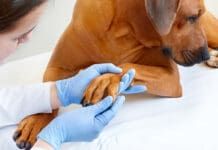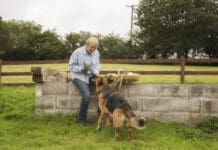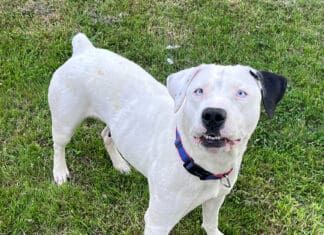It’s easy to panic when an older dog won’t eat, especially if he’s one of those “never misses a meal” dogs. But, sometimes dogs just don’t feel like eating, and one missed meal is rarely a major event.
Before getting upset over a senior dog – or any dog! – not eating, check his food:
- Have you changed foods? A change includes staying with the same brand but buying something with a different protein source. Dogs have their favorites, too!
- Is the formulation of the food the same? You might be able to tell by the ingredients, but you may need to contact the company to verify that.
- Is the food good? No one wants to eat stale or moldy food.
- Did something in your feeding method change? For some dogs, even a change of bowls (or worn-out cracked bowl!) may make a difference to them. A change of location or time of day could make a difference for some dogs, too.
Changes in your dog’s life may cause a lack of appetite. Consider:
- Is the weather hot and muggy? Uncomfortable climate changes can turn off anyone’s appetite, especially our senior dogs. A different mealtime to cooler parts of the day or a cooler room may help.
- Could your dog be dealing with stress? Think about things that changed in your household. Have you moved? Is he now going to doggie daycare? Did something cause his exercise patterns change? Is bad weather making walks and other fun activities difficult?
- Did you add a new person or pet to the household?
- Are you traveling?
- Did he recently have vaccinations?
Physical Problems
Many older dogs won’t eat, or won’t eat well, if they have chronic health problems, such as cardiac, renal, or hepatic disease. Anything that makes your dog not feel well can affect his appetite, just as it does most of us:
- Dental disease: A dog with a sore mouth may approach food, even act hungry, but then walk away.
- Nausea: This could be secondary to liver or kidney problems.
- Intestinal blockages: Many dogs are the “eat what I find” kind of canine, which can backfire on them with upset stomach or a blockage.
- Toxins: A dog might eat a plant that doesn’t agree with him or, worse yet, ingested a toxin.
- Medications: Did you add or remove a supplement your dog was getting or is he on a new or different medication?
Signs that might indicate why a dog to stop eating and should be seen by a veterinarian include:
- Diarrhea
- Vomiting
- Drooling
- Nausea
- Parasites
- Fever
If your dog hasn’t eaten in 24 hours, contact your veterinarian. While the dog can probably go two or three days without food, it’s far from ideal. It’s also likely to make things worse.
Your veterinarian will likely run bloodwork to help identify any worsening or developing problems. A thorough physical examination is important, too. A dog with a sore neck, such as from a previously undetected disc problem, may find it painful to lower his head and eat off the floor. A raised feeder may help.
If there are no obvious health concerns, consider warming his food, adding something with a strong odor, or adding wet food, if your dog is only getting kibble. Remember, too, that dogs rely on smell for appetite. Some plain low-sodium chicken broth or the juice from a can of tuna may be what your senior dog needs to stimulate his appetite. If he still won’t eat, even without other indications, it is time for a veterinary appointment.







I can’t access the digital version.